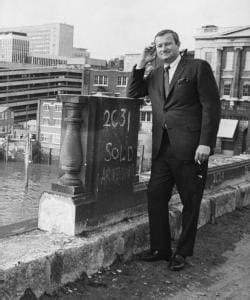A Quote by Richard Carrier
Reason bases its decisions on evidence available to everyone, and allows people to disagree when evidence is lacking. Religion will never do that.
Related Quotes
I destroy because for me everything that proceeds from reason is untrustworthy. I believe only in the evidence of what stirs my marrow, not in the evidence of what addresses itself to my reason. I have found levels in the realm of the nerve. I now feel capable of evaluating the evidence. There is for me an evidence in the realm of pure flesh which has nothing to do with the evidence of reason. The eternal conflict between reason and the heart is decided in my very flesh, but in my flesh irrigated by nerves.
People are trying to build a society where they can talk across the aisle so to speak, and have civil discourse. At the same time we're trying to inform ourselves about what's really true so that we can make evidence based decisions that is better than superstition or rumor. But the fact is that people who use evidence based decision making have much better life outcomes, greater life satisfaction, they live longer, they make better personal and medical decisions, better financial decisions. But parallel to that is you can't reason somebody out of a position they didn't reason themselves into.
A delusion that encourages belief where there is no evidence is asking for trouble. Disagreements between incompatible beliefs cannot be settled by reasoned argument because reasoned argument is drummed out of those trained in religion from the cradle. Instead, disagreements are settled by other means which, in extreme cases, inevitably become violent. Scientists disagree among themselves but they never fight over their disagreements. They argue about evidence or go out and seek new evidence. Much the same is true of philosophers, historians and literary critics.
But what, after all, is faith? It is a state of mind that leads people to believe something - it doesn't matter what - in the total absence of supporting evidence. If there were good supporting evidence then faith would be superfluous, for the evidence would compel us to believe it anyway. It is this that makes the often-parroted claim that 'evolution itself is a matter of faith' so silly. People believe in evolution not because they arbitrarily want to believe it but because of overwhelming, publicly available evidence.
We feel a deep pleasure from realizing that we believe something in common with our friends, and different from most people. We feel an even deeper pleasure letting everyone know of this fact. This feeling is EVIL. Learn to see it in yourself, and then learn to be horrified by how thoroughly it can poison your mind. Yes evidence may at times force you to disagree with a majority, and your friends may have correlated exposure to that evidence, but take no pleasure when you and your associates disagree with others; that is the road to rationality ruin.
But lack of evidence, if indeed evidence is lacking, is no grounds for atheism. No one thinks there is good evidence for the proposition that there are an even number of stars; but also, no one thinks the right conclusion to draw is that there are an uneven number of stars. The right conclusion would instead be agnosticism.
Martyrdom is evidence only of a man's honesty - it is no evidence that he is not mistaken. Men have suffered martyrdom for all sorts of opinions in politics and in religion; yet they could not therefore have all been in the right; although they could give no stronger evidence that they believed themselves in the right.
































